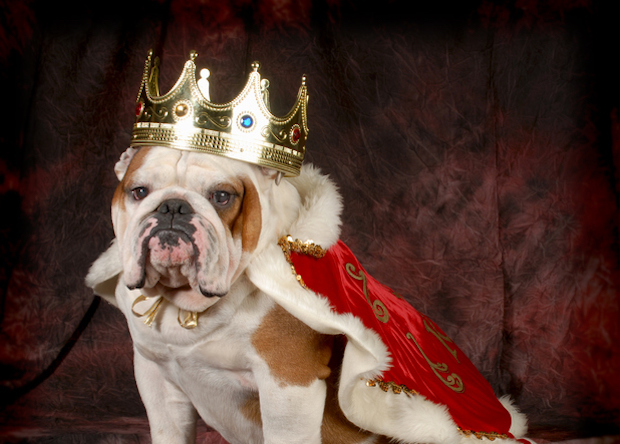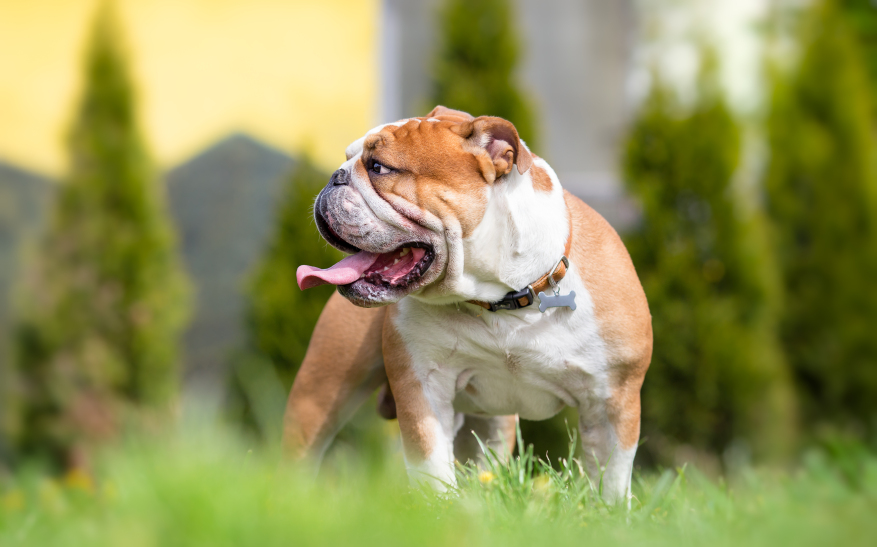Bulldogs are wonderful dogs with amazing personalities – and owning them can add to an aura of grandeur to your social status. These pets are arguably the most expensive dogs to own.
Because of their unique looks and dominant personalities, Bulldogs are always on top of the AKC’s list of the most popular dog breeds. Simply put, they are overwhelming to look at and amazing to be with.

However, taking care of a Bulldog is not a cakewalk – and the dog does not come cheap. Perhaps, it is one of the reasons why Bulldogs are not for everyone. Taking care of the dog can be very expensive! Here are some reasons why the Bulldogs are considered the most expensive dogs to own.
Bulldogs are not the most expensive dogs to buy, but yet costly to own
The Bulldog is not the most expensive dog, but he costs a lot more than many other dog breeds. The most expensive dog ever sold is a golden-haired Tibetan Mastiff. He was sold for $1.9 million in 2014. Another Tibetan Mastiff, whose name is Big Splash, was sold for $1.5 million in 2011. Bulldogs do not nearly cost that much.
Currently, purebred Bulldog puppies are sold between $1,500 and $30,000 in the United States. That’s more or less twice the price of a Labrador Retriever, the most popular dog breed in the country. A purebred Lab puppy costs between $800 and $1200. For further comparison, here are a few more popular dog breeds and their average selling price.
- Dachshund – $300 to $1,000
- German Shepherd – $500 to $3,000 depending on the line and purpose
- Rottweiler – $1,000 to $1,500
- Beagle – $800 to $1,500
Why do bulldog puppies cost so much?
Bulldogs are one the most expensive dogs to buy but their cost varies depending on their color and quality. A Bulldog puppy commands such a high price because of the following factors.
- Bulldog stud service usually costs at least $650; artificial insemination usually costs from $200 to $600 plus additional fees for shipping, containers, and storage.
- Pre-breeding preparations are also expensive.
- Most Bulldogs are born via c-section, which costs $500 to $3,000 per birth.
- The average litter size of Bulldogs is 4 to 5.
Bulldog breeders face a lot of issues during the breeding. Bulldogs have been tagged as an unhealthy breed because they are prone to a number of health issues. They suffer from Brachycephalic syndrome and are prone to hip dysplasia, progressive retinal atrophy, cystinuria, and more.
Responsible Bulldog breeders ensure that their dogs have proper health screenings for genetic issues before deciding to breed them. Prior to mating their dogs or artificial insemination, good breeders also make certain that the female dog is in good condition with on-schedule vaccinations, heartworm preventative, and deworming. These accumulated expenses on preparing dogs for breeding cost breeders significantly.
Bulldog stud services and artificial insemination too come with a hefty price tag. A few weeks after having the stud service or artificial insemination done, the female dog undergoes different pre-natal procedures, including x-rays and ultrasounds, to detect if she is pregnant. If the tests confirm pregnancy, the dog needs vitamins and special nutrition.
Most Bulldogs cannot deliver puppies normally and c-section is required because of the following reasons:
- Bulldogs have large heads and shoulders and there is a high chance they can’t pass through their mothers’ birth canal.
- Bulldogs have a high incidence of water puppies and cleft palates.
- Normal labor can take a toll on the mother because she cannot breathe properly. Pushing out puppies can be extremely difficult for her.
The accumulative expenses of a Bulldog’s pre-birth needs can be very costly. Hence, it is advisable not to breed if you are not ready to handle the expenses.
Taking care of newborn Bulldogs needs time, energy, and money
The expenditures and care go up after the puppies are born. Breeders devote a lot of their time taking care of the newborn Bulldogs and their mother. They have to spend on supplements, high-quality food, milk replacements, and other puppy products to ensure both the mother and puppies stay healthy.
Bulldogs don’t really make the best mothers since they tend to roll over their puppies – suffocating them. For this reason, it is necessary to constantly watch the mother Bulldog and her pups.
The breeder usually takes care of the puppies for at least 8 weeks. Puppies need weekly veterinary appointments to check their health and undergo deworming sessions. Most responsible breeders make sure that the puppies receive at least one shot of the core vaccines before sending them to their new families.
Healthcare costs comparatively high
The cost of healthcare makes Bulldogs the most expensive dogs to own. They are prone to many health issues. Ask any Bulldog owner and many of them would tell you about different health issues their pets get from time to time.
The most common health issues Bulldog owners are concerned about are the yeast infection, cherry eyes, digital cysts, head tremors, and skin infection. Treatment and preventive checkups increase the cost of looking after these dogs.
Cheap Bulldog vs. Expensive Bulldog: What’s the difference?
A cheap Bulldog – unless you know that the person you’re buying from is a responsible owner – comes with a lot of health issues. Most of them can cost you thousands of dollars in vet bills.
Although pet stores sell Bulldogs that are of the same price range claiming that they have well-bred Bulldogs, it is still better to get puppies directly from reputable breeders.
This is because most pet stores get their puppies from puppy mills, where many dogs are abused and inhumanely used as breeding machines. Aside from indirectly supporting the cruel industry, getting a puppy from these shops may cost you more money for veterinary expenses.
A well-bred Bulldog may cost a lot more but they often live longer and are generally healthier. If you are from the United States, it is a good idea to get an AKC-registered Bulldog puppy. Be sure to check if the puppy’s parents have passed health screenings for different genetic issues, including hip dysplasia, cystinuria, progressive retinal atrophy, etc.
Bulldogs make wonderful companion pets although they are one of the most expensive dogs to own. So it is better to get a Bulldog puppy from a breeder who genuinely loves the breed and aims to produce healthier Bulldogs that fall within the breed standard. A good breeder aims to improve the breed by selecting good parents to get rid of genetic flaws.

